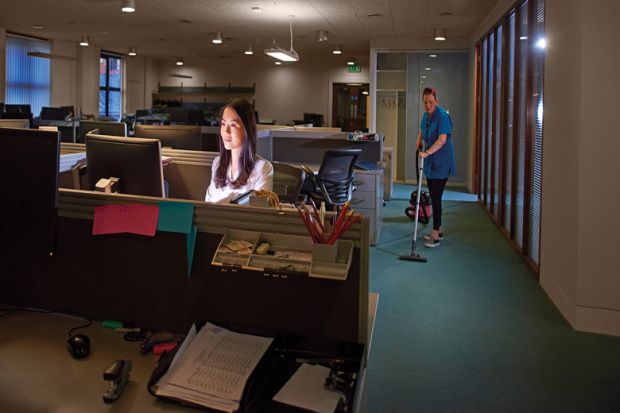An outdated view of how much control an academic has over their own schedule is hampering efforts to address chronic problems with overwork in UK higher education, according to a study.
Many institutions could be breaking the law in the terms and conditions they offer staff because of the assumption – accepted by both unions and employers – that scholars are exempt from the 48-hour cap on a working week, averaged over 17 weeks, because they are “autonomous workers”, finds the paper, published in the University and College Union’s Journal of Further and Higher Education.
Academics – and some senior professional services staff – are being denied the universal protection against what is a still “eye-wateringly high maximum” number of working hours because they are seen as having sufficient control of their working practices, akin to a managing director of a company, author Alastair Smith told Times Higher Education.
“It sounds intuitively plausible: academics do a little of what they want, when they want, but I think in reality the technicalities are that that doesn’t apply at all,” said Dr Smith, a former associate professor at the University of Warwick who is now founding director and chair of teaching and learning at a new venture, known as the Community for Alternative Thought, Learning and Action in Nature.
“Maybe in the 1960s, academics were very much like managing directors, but the situation has changed dramatically since then and workloads have become very intentionally directed,” he added.
The paper says it is “self-evident” no university staff member aside from perhaps a vice-chancellor has “total control” over their activities, with timetabled classes and meetings being the “most obvious” activities directed by their employers.
However, the exemption from the cap has formed the basis of sector-wide agreements such as the post-92 contract, Dr Smith said, which he believes prevents academics from challenging the wider culture of academic overwork.
While there is limited data on the number of hours academics work in a week, which Dr Smith said is part of the problem, surveys have shown many routinely say they work more than 50 hours a week, with that number rising for early career researchers and other more vulnerable staff members.
Dr Smith’s research identified three broad levels of compliance with working time regulations across different institutions’ terms and conditions, with anecdotal evidence showing that newer universities with more of a teaching focus tend to be better.
The best, he said, specify that anyone working more than a 35-hour week should be given time off in lieu, while others use vaguer wording that staff should “work the number of hours required but not excessively”, which is not defined.
A third type of employer, according to Dr Smith, states that academic work is “not restricted by work time regulations” and actively says “you can work as many hours as you want”.
Dr Smith said he was hopeful that universities would look at their current arrangements and voluntarily agree to consider changing their terms and conditions.
Otherwise, a successful legal challenge could establish a precedent and “create a bit of a cascade”, he said, but this would require a case being brought to the Health and Safety Executive, which oversees the legislation.
Anyone who did feel sufficiently in control of their schedule – or who wanted to work more than 48 hours per week – could opt out, as is provided for in the legislation, Dr Smith said.
Register to continue
Why register?
- Registration is free and only takes a moment
- Once registered, you can read 3 articles a month
- Sign up for our newsletter
Subscribe
Or subscribe for unlimited access to:
- Unlimited access to news, views, insights & reviews
- Digital editions
- Digital access to THE’s university and college rankings analysis
Already registered or a current subscriber? Login








